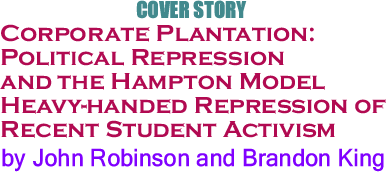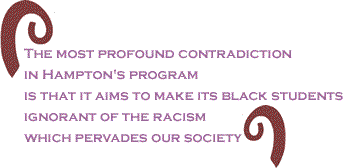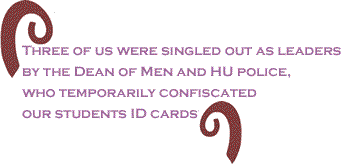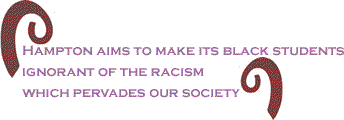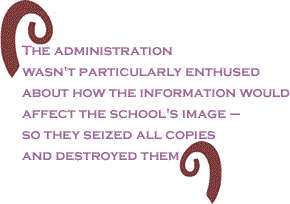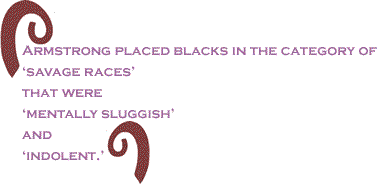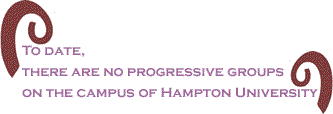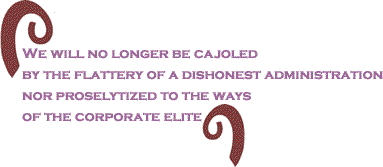
|
|||||||||||||||||||||
|
|
|
The following commentary is a first person account by the authors. The students charged in this incident were not expelled. See AP story, December 2. On Wednesday November 2, 2005, at Hampton University, the progressive campus group affiliated with Amnesty International, United Students Against Sweatshops, and Campus Anti-War Network held a student walk-out on the issues of New Orleans urban renewal, AIDS crisis, homophobia, the prison industrial complex, the war in Iraq, and the crisis in Sudan. The organizers for the group had been planning the action for some time, and promoted it with radio announcements, posters around the campus, and handing out fliers at campus group meetings. The planned activities included speeches, chants, poetry, and musical performances. Earlier that day, an international student was subjected to intense interrogation by the Dean of Women and was told by the Hampton University police that she would be shadowed by a cop. At twelve noon Brandon King began to speak to about 75-100 students in the Student Center about our plans for the day. We handed out information on the Iraq war and the Katrina disaster. Then armed HU police abruptly shut down our activities. The HU police booked several people just because they were wearing stickers and other paraphernalia that advertised our events. They booked people who weren't even wearing paraphernalia because they looked suspicious. The police used hand-held camcorders to record the faces of the activists without our permission. They attempted to intimidate the student onlookers by their random targeting. Three of us were singled out as leaders by the Dean of Men and HU police, who temporarily confiscated our student ID cards. The next day, one leader of our group, Brandon King, was told by a Hampton University Lieutenant Detective that, despite the fact that he was a "hometown athlete," he would be expelled if he did not cooperate and give up the names of other group members. Now Brandon, three sophomore activists, a junior activist, a non-affiliated supporter and John Robinson have all been summoned to an administrative hearing for violating the code of student conduct by "actions to cajole or proselytize students," "distributing and/or posting unauthorized information," and "violating the administrative guidelines for student demonstrations." The students were given notice at 5:00 p.m. Friday, November 18 to appear at an administrative hearing at 10:00 a.m. Monday, November 21. This short notice obviously made it virtually impossible for the students to organize support from lawyers, parents, witnesses, other students, and sympathetic organizations both on campus and in the wider community. Nevertheless, the Administration received many calls and e-mails and agreed on Monday morning to postpone the hearings indefinitely. Upon returning to school from Thanksgiving break on Monday, November 28, the students learned that the hearings had been rescheduled for Friday, December 2.
Shortly before the break, students met with local reporters in a nearby shopping center owned by the Administration. As the students described to the reporters the repressive conditions they face at Hampton University, a Hampton University cop, sent by the Dean of Students, confirmed the students' allegations. He pulled his squad car to within inches of the camerperson and cut short the interview by stepping inbetween the cameraperson and the student interviewee. After the reporters put their camera away, the police still demanded that they leave the property. The video footage of these events was shown on the nightly news. The story also appeared the next day as the cover story in the local newspaper, The Daily Press. The Dean of Students, in turn, wrote a letter to the editor of The Daily Press, responding that the school encourages peaceful protest, and the kids who face discipline refused to use the legitimate routes. This letter was mass copied and two copies were placed on every dorm door on campus. Repressive Rules, Selective Enforcement It is clear that the school seeks to quell all social activism by maintaining repressive rules and selectively enforcing them against any progressive student activism. "Actions to cajole and/or proselytize students" constitute an offense that is so vague and broad that virtually every student, teacher, and administrator is guilty of it every day. To "cajole" is defined as trying to influence or manipulate others through insincere arguments, which is something Hampton administrators routinely do to students. Every recognized student club on campus to some extent attempts to "proselytize," that is, to persuade students to adopt a specific orientation or actions. This rule is vague so that it can be selectively enforced in the interests of the Administration. Moreover, the school's concern about the actions of our group speaks to a much deeper issue. The Administration itself has long been guilty of attempts at cajoling and proselytizing black students with its strict assimilationist program. The most profound contradiction in Hampton's program is that it aims to make its black students ignorant of the racism which pervades our society, while fostering an elitist and individualist culture that works to the detriment of the Black Community. The accused students merely attempted to challenge the corporate bourgeois indoctrination prevalent at Hampton and to promote ideas more attuned to the interest of the community and humanity in general. It is only in the sickest sense that the promotion of human rights-related issues can be seen as an attempt to convert the students from one persuasion to another. The school makes no attempt to educate its black students on any of the issues, and seems to prefer cultivating political docility and subordinance instead.
The students also face charges of violating the guidelines set forth by the Administration on student demonstrations. It has been our experience that the provisions which control student demonstrations, as delineated in the Student Handbook, effectively prevent any expression of dissent, and therefore any semblance of democracy. This is because any demonstration, march, vigil, or rally on campus must be called by an officially recognized student group and approved in advance by the Chief of Police and Director of Student Activities. Any student group that might call for such actions never gets recognized by the Administration in the first place. Hampton University's Administration has shown time and time again that it will not recognize, nor give any legitimacy to our organizations and our causes. We have repeatedly been denied access even to the Administration's own procedures through which groups are evaluated and then either recognized or denied recognition. Our applications have never been afforded the hearings and votes to which we are supposed to be entitled. The Administration, whenever it feels like, simply announces that "there is a moratorium on new student organizations". In refusing to acknowledge and recognize the groups that they suspect to be prone to protest and activism, the Administration of Hampton, in effect, bans activism on campus. This is what has long been enforced at Hampton University. The violations outlined in the hearings summons were only technicalities, created by the arbitrary and repressive policies of the Administration itself, which seek to deny any free and independent social and political expression by Hampton University students. And now the Administration has informed the accused students that they can be expelled for their offenses. More and more students at HU believe, however, that their school's disdain for democratic principles is unacceptable and must, at all costs, be resisted. The Administration was very clear in its opposition to our agenda from the very beginning. When we put up the posters and fliers across campus at night, they organized police teams during the day to march through the campus and snatch down every paper. But the corporate elitist ethos cultivated by Hampton still had to be counteracted, so we put up more…and more. The administrative response was always swift but never swift enough, each time more overtly repressive than before. Meanwhile, students and other groups, whether officially recognized or not, routinely pass out unauthorized fliers and put up unauthorized advertisements on campus daily. The advertisements are usually promoting parties, bars and other venues for alcohol consumption. The Administration rarely interferes with this activity and never punishes those who engage in it. But the activists at Hampton put up posters about a social justice-oriented student walk-out, and passed out information on the brutal, highly unpopular War in Iraq, and they alone are threatened with the penalties outlined in the student handbook. This selective enforcement of the rules reveals the true nature of the Hampton Administration. The Hampton Model as Apparatus of Exploitation Some of the Hampton police who harassed us said that they just "had to do their job." Just for clarification, their bosses are the University President Dr. William R. Harvey, who is a Bush appointee to the Federal National Mortgage Association, and a Board of Trustees bounteous with Bush-Cheney campaign beneficiaries. A close friend of President Harvey, especially relevant to this discussion is the commencement speaker he selected this past spring, Alphonso Jackson, Bush's Secretary of Housing and Urban Development. Jackson has made a priority of cutting back access by poor black people to subsidized Section 8 housing. Shortly after hurricane Katrina, Jackson told the Houston Chronicle that most of the black population of New Orleans should not be allowed to return, and that New Orleans in the future will be a predominantly white city. The University president has often shown this same contempt for the Black Community. A recent example is when he was asked by a few members of our group at a Town Hall Meeting, the reason why the school did not have an AIDS awareness group. President Harvey responded that we probably did not need one because everyone knows about AIDS. The women did not accept that answer because they knew that AIDS disproportionately affected Blacks, and the Hampton Roads area was in the Top ten AIDS infected areas. They started a campus AIDS group the next week.
Students at Hampton University have become accustomed to, although not content with, the school's restraint of free thought and expression. The issue has arisen publicly before with the Hampton school of journalism. In 2003, a student writer for the supposedly "student-run" campus newspaper, "The Hampton Script", wrote an article about the school cafeteria and its 100-plus health code violations. The Administration wasn't particularly enthused about how the information would affect the school's image – so they seized all copies and destroyed them. They also basically purged the staff, attempted to expel the student writer, and created a task force to supervise the creative process of the newspaper. This task force, chaired by the University's Dean of Students, who has no journalistic credentials, made several "recommendations" to the newspaper staff. One worth mentioning here states that "Oversight and guidance from a faculty advisor (or advisors) with adequate journalistic knowledge and an appreciation and commitment to the Hampton Model are necessary." This model was used in the academic programs of other HBCUs. And while the faces and tactics have changed, the underlying principle is nonetheless the same. Hampton History When providing an even closer look at the educational environment of historically black colleges and universities (HBCUs), one will gain a clearer understanding of its purpose in society and also the setting for which student resistance to its educational model originated. William Watkins explained how with the creation of HBCU's more specifically, Hampton Normal and Agricultural Institute (now Hampton University) "played no small role in creating a comprador class for the twentieth century. Black compradors have anchored the Black South. They have been pious, conservative, obedient, and loyal to the sociopolitical order. They have supported gradualism, incrementalism, and non-violence over revolution. They have provided a sometimes prosperous middle class without which the capitalist economy could not have stabilized. They have acted as a buffer in the South, providing business services, education, religion, fraternal orders, and hope to a people battered by slavery, sharecropping, violence and four centuries of oppression."
An avid proponent of this as an educational model that creates these pseudo-progressive results was the founder of Hampton Normal and Agricultural Institute, General Samuel Chapman Armstrong. Armstrong's true feelings of blacks should not go unmentioned due to how these beliefs guided him in administering education to blacks. Armstrong felt the black "does not see 'the point' of life clearly; he lacks foresight, judgment, and hard sense. His main trouble is not ignorance, but deficiency of character; his grievances occupy him more than his deepest needs. There is no lack of those who have mental capacity. The question with him is not one of brains, but of right instincts, of morals and of hard work." Armstrong placed blacks in the category of "savage races" that were "mentally sluggish" and "indolent." Character training was/is the only way blacks could be salvaged. This is why Hampton University's educational model is so significant. It is not just schooling, but also it was/is, as Watkins puts it, "saving a race from itself." The most prominent black advocate for this model was Armstrong's neophyte Booker T. Washington. Because blacks faced oppression and political repression on a daily basis, W.E.B. Du Bois felt this reality should not go ignored. He pleaded with Washington to address these realities by stating, "It is wrong to encourage a man or a people in evil doing; it is wrong to aid and abet a national crime simply because it is unpopular not to do so… We have no right to sit silently by while the inevitable seeds are sown for a harvest of disaster to our children, black and white." In saying this, Du Bois draws the line between himself and supporters of Armstrong's and Washington's form of education and indoctrination. When black students rebel against the existing social order, they are looked at as deviant because they buck an educational model that truly does not function in their favor. Student Resistance Through the Years At Hampton University in 2005, this student resistance has been more intense perhaps than ever before. In the wake of such social atrocities as the Katrina disaster, black students have achieved a much higher degree of political consciousness than in previous years. The student activist group at Hampton, whose members are now being threatened with expulsion, has worked tirelessly for years promoting consciousness on social issues and providing ways for students to become involved.
In the Fall of 2002, students attempted to get Dr. Taye Wolde-Semayat, a former political prisoner in Ethiopia and President of the Ethiopian Teachers Union, to speak on campus. He had been released following a five-year campaign by Amnesty International, the National Union of Teachers, and teachers' unions around the world. Hampton University refused to allow him to speak on campus. The Vice President of Student Affairs, Dr. Bennie McMorris, signed a form which would allow for Dr. Taye to speak on campus but later rescinded his signature and refused to allow the event to take place on campus. The students got a local church as a venue for Dr. Taye to speak. These students also organized massive carpooling for students to attend the event. Over 200 people, including community and church members, students, and faculty attended the event which was held two miles away from the campus. After this event, our organization continued to fight to be a recognized organization on campus. We were met with an Administration that repudiated the idea of recognizing an organization that sees as its mission advocating, promoting, and mobilizing people to fight for human rights. Each year we applied for recognition and have been consistently denied access to the democratic process to which we are entitled. Not only has our organization been denied recognition, but other socially conscious and politically aware groups have also been denied. To date, there are no progressive groups on the campus of Hampton University. Securing the Future That has not stopped us from organizing. We've managed to have our meetings in random classrooms on campus through developing really good relationships with campus workers. Many students see the need to address social justice issues through activism and education. Even though the University does not provide an environment conducive to activism or allocate any resources to our group, we've managed not only to function, but to grow. Our membership has increased exponentially and the members are more passionate than ever. The Administration is now attempting to stifle this growth by singling out the next generation of activists and trying to scare them into committing themselves to the Hampton Model. When the HU police and Administration stopped our gathering, some of the members of our group felt demoralized. We thought that the intimidation of students by the Campus police and Administration meant that we had failed. But seeing how energized the campus became after the incident helped us change the way we saw the situation. Although the police prevented us from making the point that we intended to make, the students ultimately were made conscious in a much deeper way that could not have been achieved through our speeches and poetry. The students saw what their school's Administration was really for by seeing what it was against. Students saw first hand what happens when students stand up for human rights and social justice. So many students openly express their anger with the way Hampton handled the situation. Students have been very supportive and sympathetic with what we are doing at Hampton. Students who wouldn't normally have been involved are now compelled to be active after watching their school reveal its "true colors." The Administration was so arbitrary and ruthless that it threatened an unaffiliated supporter with expulsion. It seems that even moral support for activism is a grave violation to Hampton's Administration. These recent events have exposed the true nature of Hampton University, its educational model, how it fits into the rest of society, and above all else, why it should be resisted.
As students face administrative hearings that promise to be as grossly undemocratic as the proceedings thus far, it is imperative that we send a message to Hampton officials that they cannot get away with this. We have gotten much support from students on campus, as well as individual and groups outside the school who share our passion and recognize the interconnectedness of our plights. However, we still need a lot more. By singling out the younger activists, the school figures it can "nip activism in the bud" and it is thus our duty to make it clear that they can do no such thing. It is vital that African Americans are able to express their concern about the issues that so uniquely and disproportionately affect our community. This remains true despite the large sums of money the university receives from the military and other places for maintaining a docile student body. We aim to act not defensively, but counter-offensively in our resistance. It is not enough to just ask the Administration to leave us alone in this one instance. We intend to illuminate problems that perennially have plagued the campus of Hampton and we therefore DEMAND that Hampton University drop all charges against the five students and change its general policy toward social justice-oriented groups on campus. We will not accept this denial of democratic procedure, nor the school's betrayal of the Black Community. We are black students and we will no longer be cajoled by the flattery of a dishonest Administration nor proselytized to the ways of the corporate elite. We will not forget about our people. We will not be intimidated. Fight not for us, but with us because the actions of the Hampton Administration and the increasingly frequent campus repression happening nationally, ultimately threaten us all. Call the school! Let Hampton Administrators know how you feel. Tell them to drop all charges against the students, recognize the activist club as an official student organization, and craft a free speech policy that doesn’t criminalize dissent. Dr. Bennie McMorris, 757-727-5303 757-727-5486 John Robinson is an organizer at Hampton University. He is one of the students charged in violation of the Hampton University Student Code of Conduct. He is a senior sociology major from Washington D.C. Brandon King is also both an organizer at Hampton U and one of the students charged in violation of the Hampton University Student Code of Conduct. He is a senior sociology major and a native of Chesapeake VA. For updates on the situation unfolding at Hampton University go to Defend Hampton University Students Support Hampton Students' Right to Protest! And for support please send email to [email protected]. |
|
| Home | |
Your comments are always welcome. Visit the Contact Us page to send e-Mail or Feedback or Click here to send e-Mail to [email protected] e-Mail re-print notice
If you send us an e-Mail message we may publish all or part of it, unless you tell us it is not for publication. You may also request that we withhold your name. Thank you very much for your readership. |
|
| December 8 2005 Issue 162 |
|||||||||
|
|||||||||
|
|
|||||||||
| Printer Friendly Version in Plain Text or PDF format. Download free Adobe Reader. | |||||||||
 |
|||||||||
 |
|||||||||
| |
|||||||||
| |
|||||||||





















